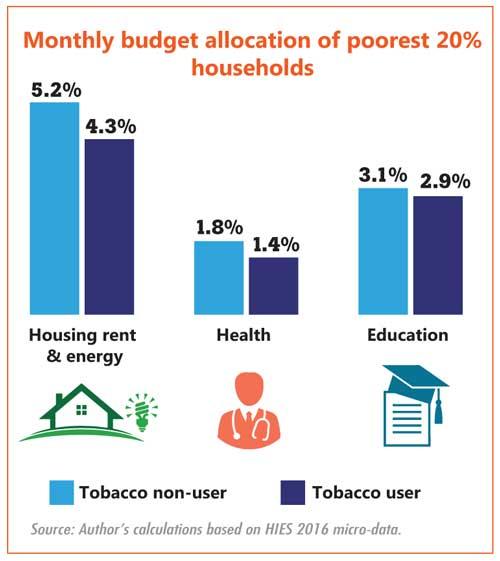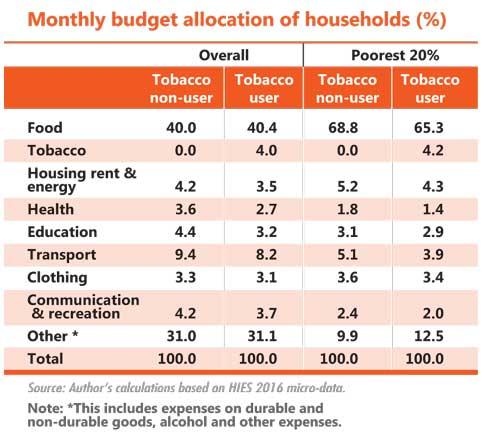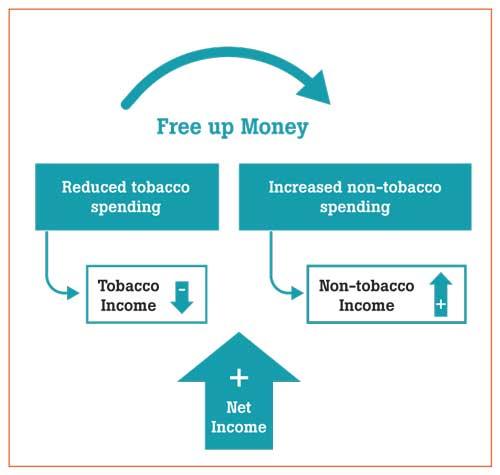09 Nov 2020 - {{hitsCtrl.values.hits}}
 On average, a tobacco-user household spends nearly Rs.2000 per month on tobacco, constituting 4 percent of the household budget. Spending on tobacco can drive out other critical expenditures, including basic needs. This crowd-out effect would be greatest for poor families, affecting not only the smoker but the rest of the family as well. Smoking, therefore, is not only unhealthy but costly.
On average, a tobacco-user household spends nearly Rs.2000 per month on tobacco, constituting 4 percent of the household budget. Spending on tobacco can drive out other critical expenditures, including basic needs. This crowd-out effect would be greatest for poor families, affecting not only the smoker but the rest of the family as well. Smoking, therefore, is not only unhealthy but costly.

“We feel guilty when our family members complain about not having sufficient money to buy food provisions. If I had not wasted money on cigarettes, we could have used that money for other needs.” - Male driver at an IPS Focus Group Discussion in Colombo (November 2019).
When tobacco users stop smoking, they spend their money freed from tobacco products on other goods and services -- food, health, education.
Although Sri Lanka has made good progress over the years, in reducing the prevalence of tobacco use to 28.4 percent of males above 15 years, further action is needed to target the ‘Last Mile’ of tobacco users. These remaining smokers are concentrated among over 40s, low-income males. Targetted policies to reduce tobacco consumption among these groups would enhance the economic well-being of these tobacco users and their families, who are more likely to be poor, as it would free up money for basic needs.

In addition, tobacco users are at much higher risk of falling sick and dying prematurely, due to tobacco-related diseases such as cancers, heart attacks and respiratory diseases. Tobacco-related illness can cause severe financial strains - pushing families into poverty, by depriving them of much-needed income and imposing additional costs for healthcare in the long run.
Beyond the household level, switching consumer spending from tobacco products to other goods and services, positively impacts the national economy as well.
The IPS’ ongoing study on the ‘Impact of Tobacco Control on National Income’ reveals that reduction of tobacco products will have a positive rather than negative impact on the national income.
Following the Economics of Tobacco Toolkit developed by the World Bank, the IPS research examined the impact of tobacco consumption reduction on the national economy, using the national input-output tables developed by the Census and Statistics Department.
The analysis involves following three main steps:

Impact of tobacco spending on household budget
The IPS study reveals intra-household budget allocation is negatively affected by tobacco expenditures. Poor families in particular spend a larger proportion of their income on tobacco. Among the poor, tobacco-using households allocate a significantly lower budget share to all commodity groups (except for other expenses) than non-tobacco-user households.
Tobacco-user households spend an even greater share of their budget allocation for tobacco (4.0 percent) than education (3.2 percent) and health (2.7 percent) spending.
Among the bottom 20 percent, tobacco-user households spend less on food, education, health and housing than same the economic group - non-tobacco using households.
This suggests that if tobacco users were to stop smoking, they would spend more money on their own and their family’s food, health and education.
How might reduced tobacco consumption affect national income?
Tobacco control measures are designed to reduce consumer demand for tobacco products. This shift in demand can lead to reduced spending on tobacco products and increased spending on other goods and services. Thus, income loss in the industry related to tobacco can be countered with income gain in other industries, based on consumer non-tobacco spending, due to money saved from reduced tobacco expenditure.
Despite the obvious threat of tobacco to human health, many governments have not taken significant action to tobacco control, partly due to concerns about the undesirable consequences on national income. The fear of the possible negative impact on national income by reduced tobacco production is due to a lack of information.
The IPS study reveals the net effect of tobacco control policies on national income is positive, as a result of consumers switching their spending from tobacco products to other goods and services.
With the application of World Bank developed economics of tobacco methodology, the IPS study reveals a 20 percent reduction in tobacco expenditure will lead to 30 percent net benefit to the economy through increased consumption of non-tobacco goods and services. The study assumed that the money released from tobacco purchases is spent on non-tobacco goods and services in proportion to consumption pattern of HIES survey. Thus, the IPS study offers compelling evidence that reduced tobacco consumption will yield net positive gains for Sri Lanka’s economy, as evidenced in other countries like Vietnam.
Way forward
The findings of the IPS study highlight the importance of tobacco control policies in Sri Lanka. Implementing tobacco control policies to reduce smoking prevalence will enhance the economic well-being of people, particularly the poor, as it would free up more resources for basic needs such as food and education, thereby resulting in a positive gain for the whole economy. This is very important information for policymakers who are hesitant to make tobacco control efforts.
For a developing country like Sri Lanka, it is essential to integrate tobacco control measures into poverty alleviation policies and programmes to benefit the individual, household and national economy.
(This article was originally published in ‘Talking Economics’, the blog of the Institute of Policy Studies of Sri Lanka (IPS), Sri Lanka’s apex socio-economic policy think tank. Link to blog: https://www.ips.lk/talkingeconomics/2020/11/05/tobacco-economics-how-reduced-consumption-benefits-the-household-and-the-national-economy/)
(Priyanka Jayawardena is a Research Economist at the IPS. Her research interests include education and skills development, labour economics, inequality analysis, health economics and child nutrition. She holds a BSc (Hon) in Statistics and an MA in Economics from the University of Colombo. She can be reached at [email protected])
24 Dec 2024 22 minute ago
24 Dec 2024 1 hours ago
24 Dec 2024 3 hours ago
24 Dec 2024 3 hours ago
24 Dec 2024 4 hours ago